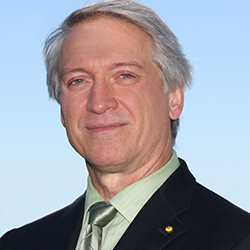Stephen P. Hinshaw Ph.D.
 Professor and Vice Chair
Professor and Vice Chair
Department of Psychiatry
University of California, Berkeley
Email: hinshaw@berkeley.edu
Discipline: Psychology
Expertise: Gender Issues, Behavior Disorders
Investigator Award 
ADHD Medication in America: Society, Schools, and Public PolicyAward Year: 2008 Attention deficit/hyperactivity disorder (ADHD) affects over 4 million children in the United States. The disorder inhibits academic achievement and the development of social relationships, life skills, and independence. Yet the causes of ADHD and its diagnosis and treatment remain mired in controversy. Co-PIs Richard M. Scheffler, Ph.D. and Stephen P. Hinshaw, Ph.D. examine clinical and policy issues surrounding the diagnosis and treatment of ADHD. Their project, ADHD Medication in America: Society, Schools, and Public Policy, considers ADHD's biological basis and risk factors; market influences on diagnosis and medication rates; prevalence and treatment disparities; the impact of relevant federal and state laws on schools, children, and their parents; and the cost effectiveness of treatment options. Drs. Scheffler and Hinshaw will produce evidence-based policy recommendations for reducing diagnostic and treatment disparities, for improving access to effective treatments, and for increasing use of the most cost-effective treatments. Their research findings should inform policy debates and expand our understanding of how to treat children with ADHD more effectively and improve their quality of life.
Background 
Stephen Hinshaw is professor and vice chair of the department of psychiatry at the University of California, Berkeley. After receiving his A.B. from Harvard in 1974, summa cum laude, he directed day school and residential programs for children with developmental disabilities for three years. He received his Ph.D. in clinical psychology from UCLA in 1983. While a graduate student there, he received the campus-wide Distinguished Scholar Award. He was a clinical psychology intern at UCLA's Neuropsychiatric Institute from 1981-2 and a post-doctoral fellow at the Langley Porter Psychiatric Institute of the University of California, San Francisco, from 1983-5, where he received the R. E. Harris Award. He taught in the psychology department at UCLA from 1986-1990 and joined the Berkeley faculty in 1990. His work focuses on developmental psychopathology, with particular emphasis on (a) peer and family relationships in children with externalizing disorders, (b) neuropsychological risk factors for and correlates of psychopathology, (c) comparisons and combinations of pharmacologic and psychological interventions for children with ADHD, (d) assessment and evaluation, (e) conceptual and definitional issues in the field, and (f) stigma and mental disorder. He has directed summer research camps and conducted longitudinal studies for boys (and, more recently, for girls) with ADHD and associated disorders for over 25 years. Hinshaw has authored over 200 articles, chapters, and reviews on child psychopathology. His first book, Attention Deficits and Hyperactivity in Children, was published by Sage in 1994. Other books include The Years of Silence are Past: My Father's Life with Bipolar Disorder (Cambridge University Press, 2002) and The Mark of Shame: Stigma of Mental Illness and an Agenda for Change (Oxford University Press, 2007). His edited books include Breaking the Silence: Mental Health Professionals Disclose their Personal and Family Experiences of Mental Illness (Oxford University Press, 2008) and Child and Adolescent Psychopathology (New York: Wiley, 2008), with T. Beauchaine. His newest book, The Triple Bind: Saving Our Teenage Girls from Today's Pressures, was published by Random House/Ballantine in 2009. In support of his research efforts, he has received over $12 million in research grants from the National Institute of Mental Health and other federal agencies. He is the editor of the journal Psychological Bulletin, the most cited journal in the field of psychology. He is also associate editor of the journal Development and Psychopathology. He is former president of the International Society for Research in Child and Adolescent Psychopathology and Division 53 of the American Psychological Association (Society for Clinical Child and Adolescent Psychology). He is also a Fellow of the American Psychological Society, the American Psychological Association, and the American Association for the Advancement of Science (AAAS). Hinshaw received the Distinguished Teaching Award, College of Letters and Sciences, University of California, Berkeley (2001).
